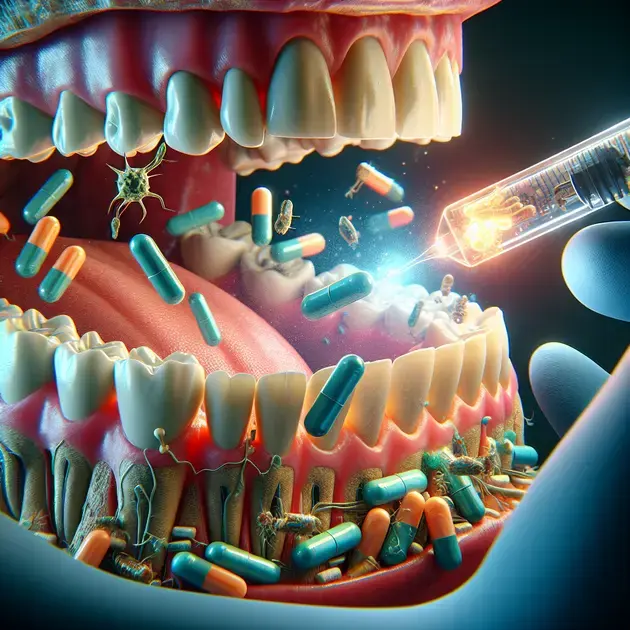Managing Periodontitis can be a challenging task, especially when it comes to choosing the right medication to treat the condition effectively. With advancements in modern medicine, there are now various options available for patients to manage their periodontitis symptoms and improve their oral health.
In this comprehensive guide, we will explore the different medications commonly used in the management of periodontitis, their mechanisms of action, potential side effects, and how they can help individuals maintain healthy gums and teeth. Understanding the role of medication in treating periodontitis is essential for both patients and healthcare providers to work together towards successful treatment outcomes.

Choosing the Right Medication for Periodontitis
When it comes to choosing the right medication for periodontitis, it’s essential to consult with your dentist or periodontist. They will evaluate the severity of your condition and recommend the most appropriate treatment plan. One common medication prescribed for periodontitis is an antibiotic called doxycycline. This medication helps to reduce the bacteria causing the infection and promote healing in the gums.
To obtain this medication, you will need a prescription from your healthcare provider. You can either visit your dentist in person for a consultation or use telemedicine services like Teladoc. Teladoc is a telehealth platform where you can schedule an online appointment with a licensed healthcare provider and receive a prescription for doxycycline if deemed necessary.
Once you have the prescription, you can purchase the medication at your local pharmacy or use an online pharmacy service such as GoodRx. GoodRx is a website and mobile app that allows you to compare prices of prescription medications at different pharmacies and offers discounts to help you save money on your medication for periodontitis.
Before starting any medication for periodontitis, make sure to follow the dosage instructions provided by your healthcare provider and inform them of any other medications or supplements you are taking to avoid potential drug interactions.
Regular follow-up appointments with your dentist or periodontist are crucial to monitor the effectiveness of the medication and make any necessary adjustments to your treatment plan.
Exploring Common Medications for Periodontitis Management
Managing periodontitis often involves a combination of treatments, including medications to control infection and inflammation. Common medications used for periodontitis management include antimicrobial mouth rinses like chlorhexidine. These mouth rinses help to reduce bacteria in the mouth and prevent the progression of gum disease.
To explore common medications for periodontitis management, you can visit reputable dental websites such as the American Dental Association (ADA) or the Academy of General Dentistry. These websites provide information on different medications used in the treatment of gum disease, including their benefits and possible side effects.
If you prefer a more interactive approach, you can download the ADA’s mobile app, ADA Dental Drug Handbook, available on both iOS and Android devices. This app provides detailed information on various dental medications, including those used for periodontitis management, and allows you to search for specific drugs based on your treatment needs.
In addition to medications, practicing good oral hygiene habits such as regular brushing, flossing, and dental cleanings is essential for managing periodontitis effectively. Your dentist or periodontist may also recommend lifestyle changes such as quitting smoking and improving your diet to support the success of medication-based treatments.
By exploring common medications for periodontitis management and following a comprehensive treatment plan, you can improve the health of your gums and prevent further progression of gum disease.
The Role of Medication in Treating Periodontitis
Medication plays a vital role in treating periodontitis by targeting the underlying causes of the disease and promoting gum health. One key medication used in periodontitis treatment is a class of drugs called bisphosphonates. These medications help to inhibit bone loss and promote bone regeneration in the jaw, which is crucial for supporting the teeth and preventing tooth loss.
To understand the role of medication in treating periodontitis, you can access reputable medical databases such as PubMed or Medscape. These platforms offer in-depth articles and research studies on the effectiveness of different medications in managing gum disease and their impact on oral health.
If you prefer a more visual approach, you can watch educational videos on periodontitis treatment and medication on platforms like YouTube. Many dental professionals share valuable insights and guidance on the use of medications in conjunction with other dental treatments to achieve optimal outcomes for patients with gum disease.
Your periodontist will determine the most suitable medication for your condition based on the severity of your periodontitis and your overall health. It’s essential to communicate any concerns or side effects you may experience while taking the medication to your healthcare provider for proper management.
By recognizing the role of medication in treating periodontitis and adhering to your treatment plan, you can enhance the effectiveness of your gum disease treatment and maintain a healthy smile for years to come.

**Effective Use of Antibiotics for Managing Periodontitis**
Introduction
Periodontitis is a common inflammatory condition that affects the gum tissue and bone supporting the teeth. It is crucial to effectively manage periodontitis to prevent further complications and preserve oral health. One of the treatment options for periodontitis includes the use of antibiotics to control the bacterial infection causing the disease.
Role of Antibiotics in Periodontitis Treatment
Antibiotics can play a significant role in managing periodontitis by targeting and eliminating the harmful bacteria in the periodontal pockets. These medications can be prescribed in various forms, such as pills, gels, or mouth rinses, depending on the severity of the condition. When used in combination with scaling and root planing, antibiotics can enhance the effectiveness of the treatment and promote better gum health.
Guidelines for Antibiotic Use
It is essential to follow specific guidelines when using antibiotics for managing periodontitis. Dentists may perform microbial testing to identify the type of bacteria present in the periodontal pockets and prescribe the most effective antibiotics accordingly. Patients should strictly adhere to the prescribed dosage and duration of the antibiotic treatment to ensure optimal results and minimize the risk of antibiotic resistance.
Potential Side Effects and Considerations
While antibiotics can be beneficial in managing periodontitis, they may also have potential side effects such as gastrointestinal upset, allergic reactions, or the development of antibiotic-resistant bacteria. Dentists should carefully assess the patient’s medical history and consider any allergies or sensitivities before prescribing antibiotics. It is crucial for patients to communicate any adverse reactions to their dentist promptly.
Conclusion
Effectively using antibiotics as part of a comprehensive treatment plan for periodontitis can help control bacterial infection, reduce inflammation, and promote healing of the gum tissues. By following proper guidelines, understanding the role of antibiotics, and being aware of potential side effects, both patients and dental professionals can work together to manage periodontitis successfully and maintain optimal oral health.
**
Conclusion
**
Antibiotics play a crucial role in managing periodontitis by targeting and eliminating harmful bacteria, aiding in the reduction of inflammation, and supporting the healing process of gum tissues. When incorporated into a comprehensive treatment plan alongside scaling and root planing, antibiotics can significantly enhance the effectiveness of periodontal therapy.
Following specific guidelines for antibiotic use, including microbial testing to personalize treatment and adhering strictly to prescribed dosages, is essential to ensure optimal results and minimize the risk of antibiotic resistance. This personalized approach not only improves treatment outcomes but also fosters the preservation of oral health in the long term.
While antibiotics present benefits in combating periodontitis, it is crucial for dental professionals to consider potential side effects and patient-specific factors. By carefully assessing medical histories, allergies, and sensitivities, dentists can mitigate risks and tailor antibiotic prescriptions to individual needs, promoting safer and more effective treatment outcomes.



